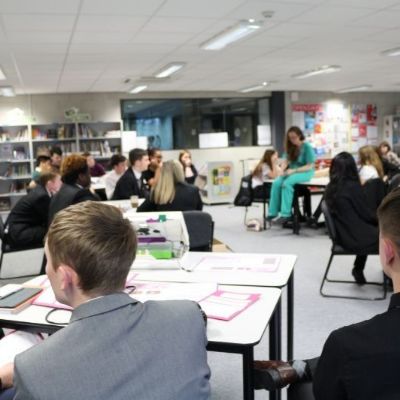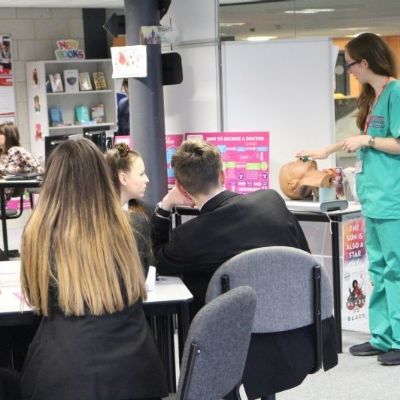Science Department
In the science department at Corby Technical School we strive to ensure that young people entering the workforce of the 21st century have the knowledge and skills needed to promote economic, scientific, and technological development. In addition, it is to give our future citizens of the United Kingdom an understanding of scientific and technical approaches along with supporting evidence; allowing them to be able to make informed decisions on current and future scientific and technological issues.
Within our department's ethos we endeavour to uphold all core British value, with particular emphasis on Tolerance, Responsibility, Liberty and Respect, which often play a crucial role within science both in the classroom environment and the wider scientific community, further ensuring the success of our student within our care beyond their time with us.
We have a strong belief that it is crucial to close the gap between our advantaged and disadvantaged students, by ensuring excellent teaching in all lessons, providing opportunities beyond timetabled lessons to support and implement strategies for all students needs as well as being upstanding role models to all our students in and out of the classroom. Our extended curriculum encourages a joy and passion for science beyond that which is taught with in the classroom; giving opportunity to broaden key employability skills including technical knowledge, scientific enquiry and problem-solving, further enabling opportunities for success for all students
At KS4, students study:
- Edexcel (1SC0) GCSE Combined Science or
- Seperate Sciences - Edexcel (1BI0, 1CH0,1PH0) GCSE Biology/Physics/Chemistry
OCR’s Cambridge Technical (Level 3 Extended Certificate) in Applied Science, enables to students to explore science from an applied approach with a focus on Laboratory procedures and legislation. As well as scientist knowledge, research, and practical skills. This Course has two examined units and three coursework units, and provides and wide range of transferable skills both within and beyond science.
At KS5 students study:
- OCR (H420) A Level Biology
- OCR (H556) A Level Physics A
- OCR (H432) A Level Chemistry
- OCR (5847) Cambridge Technical (Level 3 Extended Certificate) in Applied Science
Facilities:
Developing classrooms that inspire students is what we are striving for within the Science Department. Our classes have examples of work that students can aspire to along with intervention tools to support progression.
Running our two prep-rooms is a qualified full-time technician who has strengths surrounding all three sciences, which is an asset to the department.
In addition to our well-equipped labs and classrooms, being a STEM focus school, each classroom is equipped with a smart board and speakers. Additional access to five computer labs or a class set of iPad allows for learning science through a different medium or assessing learning through a unique project.
A-Level Options:
Students who choose to pursue a Science A-Level at Corby Technical School can have their pick of four subjects: Biology, Chemistry, Physics or vocational Applied Science.
The chosen exam board for our A-Levels is OCR where Biology and Physics follow the ‘A’ specification and Chemistry follows the ‘B’ specification.
- OCR Biology A allows students to develop relevant practical skills alongside essential knowledge and understanding of a range of biological concepts and scientific methods.
- OCR’s A Level Chemistry A qualification engages students by presenting chemical ideas and practical skills in a variety of contexts, relating modern-day applications of chemistry and current research to the fundamental concepts which are needed to continue developing the study of chemistry
- OCR’s A Level in Physics A, enables students to build on their knowledge of the laws of physics, applying their understanding to solve problems on topics ranging from subatomic particles to the entire universe. Throughout all module’s students will have the opportunity to develop relevant and transferable practical skills.
Useful Department-Wide Links:
Revision Guides:
Use the following link: https://www.cgpbooks.co.uk/bookspaceInfo and put in the code found in the front of your Edexcel CGP revision guide, which allows you to have full access to an online platform which can be used to support revision.
Revision guides can be purchased from the school at cost, which is approximately half the cost of what they are in the shops.
Homework Links:
Person Active learn: www.pearsonactivelearn.com
Sam Learning: www.samlearning.com
Revision Links:
Combined Science BBC Bitesize: https://www.bbc.com/bitesize/examspecs/zqkww6f
Separate Science BBC Bitesize
Biology: https://www.bbc.com/bitesize/examspecs/zcq2j6f
Chemistry: https://www.bbc.com/bitesize/examspecs/zy984j6
Physics: https://www.bbc.com/bitesize/examspecs/zqpshv4
Helpful videos: https://www.youtube.com/user/myGCSEscience
*Please remember videos are used in conjunction with revision guides and teacher intervention.
Career Links:
If you love science remember that not all career choices require a science degree. There are a large number of careers which are achievable through all post-secondary education pathways including apprenticeships, Level 3 qualifications (Vocational or A-Level), HND or University. The pathway needs to be right for you, but a good science qualification is a must. Some examples of science careers are:
Electrician
Electricians are the people who bring electricity to our homes, schools, businesses, public spaces, and streets – lighting up our world, keeping the indoor temperature comfortable, and powering TVs, computers, and all sorts of machines that make life better. Electricians install and maintain the wiring and equipment that carries electricity, and they also fix electrical devices.
Specific course requirements vary from college to college, but generally, they need 4 GCSEs at a grade 3 (Science recommended) or above and GCSE English and Maths at grade 4 or above.
Pilot
Pilots fly aeroplanes, helicopters, and other aircraft to accomplish a variety of tasks. While the primary job of most pilots is to fly people and cargo from place to place, 20 per cent of all pilots have more specialised roles, like dropping fire retardant, seeds, or pesticides from the air, or helping law enforcement rescue and transport accident victims, and capture criminals. Pilots enjoy working and helping people in the "third dimension."
Specific requirements will vary depending on where you decide to study. To be successful in this career someone needs to either take a course to get an Airline Transport Pilot's Licence or a Degree in Aviation. You will require GCSEs at grade 4 or above and A-Levels in subjects like maths, science, English and a second language.
Forensic Science
Guilty or not guilty? The fate of the accused in court lies with the evidence gathered at the crime scene. The job of the forensic science technician is to collect evidence and use scientific principles and techniques to make sense of it. It can be a graphic and challenging job, but very rewarding. If you like the idea of using science to help deliver justice, then you should investigate this career.
To start as a forensics lab support assistant, you'll need A-levels in Chemistry or Biology, BTEC or an HND in Science. You could also gain a degree in Forensics where 3 A-Levels are required with one of them being in Chemistry.





